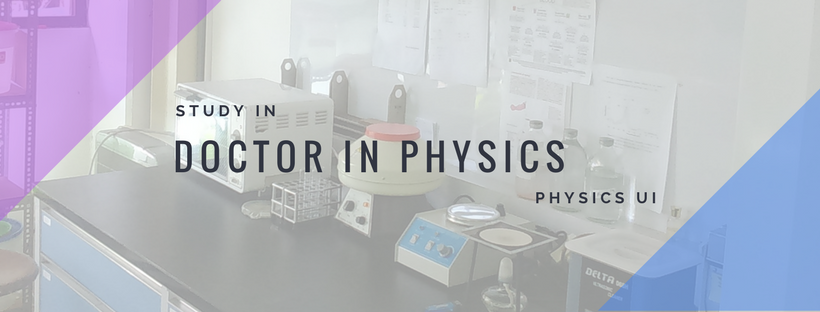
With the experience of managing the Bachelor Physics Program since 1961 and Graduate Physics Program since 1990, starting from 2017 Department of Physics, Faculty of Mathematics and Natural Sciences University of Indonesia began to carry out the Doctor in Physics Program.
The vision of the Doctoral Program in Physics is the vision of the Department of Physics Universitas Indonesia. The vision is “To become a center for education and research in the field of Physics and Applied Physics that is superior and competitive and able to solve problems and challenges at the national and global levels, towards excellence in Southeast Asia.”
- To maintain and strengthen the excellence in education and research in Physics and
Applied Physics. - Improve internal management that can encourage the active and productive involvement
of teaching staff/lecturers and students to increase scientific activities and scientific
works in physics and applied physics with national and international qualities. - To actively participate in providing services as a manifestation of the dedication and
contribution of Physics and Applied Physics to the community. - To prepare graduates who are ready to compete in the global market.
Research Fields
Theoretical Nuclear and Particle Physics
Investigating the natural phenomena in the microscopic (nuclear and subnuclear) or macroscopic (astrophysics and cosmology) realms to develop the science itself for the human understanding of the universe by using theoretical and computational approaches.
Investigating phenomena and properties of the material, such as electricity, magnetism, optics and combinations of the three with more emphasis on the aspects of physical explanation of phenomena and the properties of material, both experimentally and theoretically.
Investigating the application of physical properties of material related to the working mechanism of sensors, either mechanical, magnetic, optical, or chemical sensors, leading to the development of sensor devices, measurement systems, control systems, and data acquisition systems applicable to measurements in the fields of Materials, Medical , Biology and Chemistry.
Medical Physics and Biophysics
Investigating the physical quantities of living things and their applications to the medical field. The field of medical physics is multidisciplinary and deals with the application of physics in the field of medicine in the form of physics applications in Radiology Diagnostics, Radiotherapy, Radiation Oncology, and Nuclear Medicine. The Biophysics field studies the use of algae as an energy source, hard tissues biomaterials such as bones and other hard tissues, etc.
Studying the physical quantities and their applications to earth exploration. Research in this field is carried out by utilizing physical parameters such as rock resistivity, mechanical wave propagation, and dielectric constant of rocks. It includes studying and mapping the condition of subsurface rocks, from the surface to the center of the earth, for oil and gas exploration, geothermal, mineral as well as exploration of environmental issues.
About Graduates
General Competencies
- Create innovative, original and tested works through research in the field of physics and its applications.
- Develop science and technology through research in physics and its applications.
- Disseminate research results in the field of physics so as to gain national and international recognition
- Solve the problems of science and technology in the community with the principles of physics and communicate the results to the community.
The Doctor in Physics curriculum is competency based which is commensurate with the Indonesian National Qualification Framework (KKNI) Level 9.
The curriculum is designed to produce graduates who are able to develop physics and their applications through nationally and internationally recognized research with a multidisciplinary, interdisciplinary and transdisciplinary approach.


 English
English Indonesia
Indonesia